
Find Help
More Items From Ergsy search
-

Is IVF successful?
Relevance: 100%
-
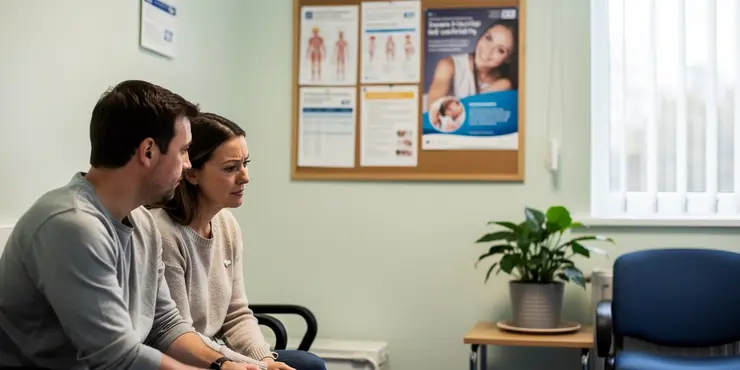
What is IVF?
Relevance: 100%
-

Are there risks associated with IVF?
Relevance: 95%
-

Who might need IVF?
Relevance: 93%
-
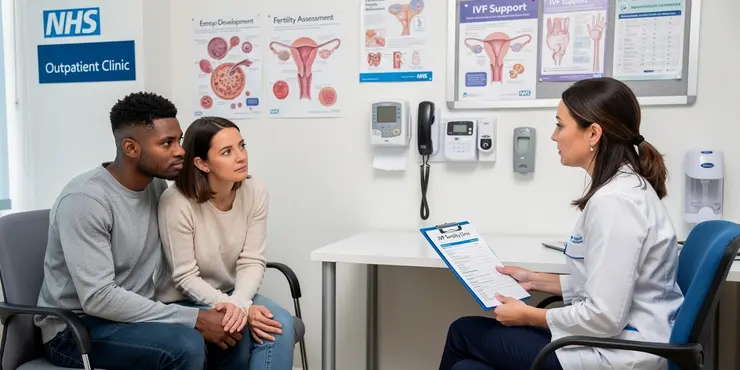
Does IVF guarantee pregnancy?
Relevance: 92%
-
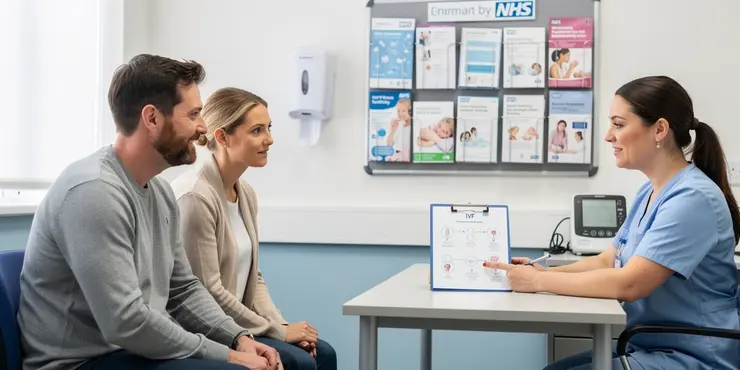
How does IVF work?
Relevance: 91%
-
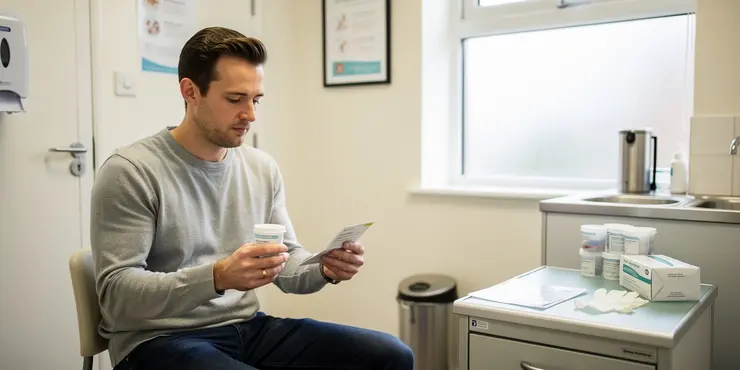
How is the sperm used in IVF?
Relevance: 90%
-

IVF Fertility Treatment from MumsNet
Relevance: 90%
-
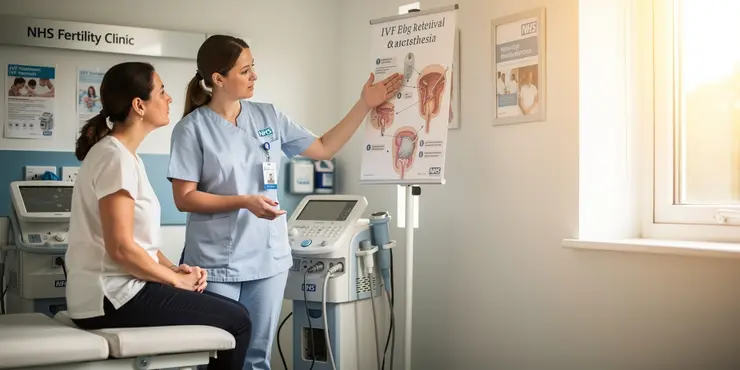
Does IVF require anesthesia?
Relevance: 90%
-
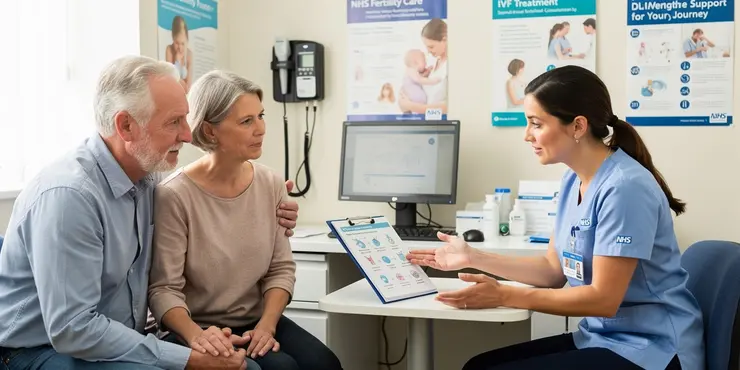
What is IVF and how does it work?
Relevance: 88%
-

Infertility - IVF Treatment and Patient Information
Relevance: 87%
-
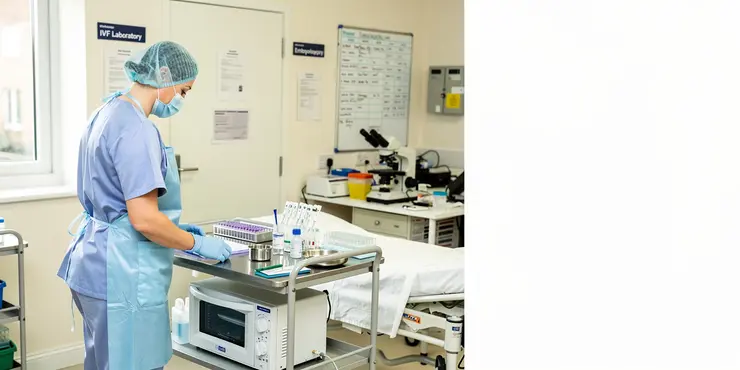
What is the role of the embryologist in IVF?
Relevance: 87%
-
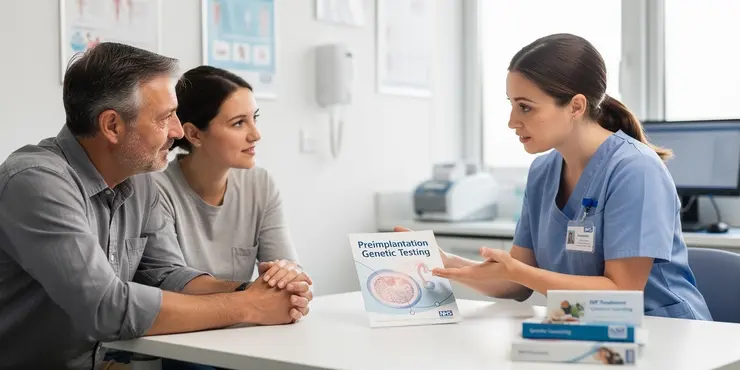
Can IVF be used for gender selection?
Relevance: 86%
-

How do clinics determine if IVF is the right option?
Relevance: 86%
-

What are the main steps in an IVF cycle?
Relevance: 85%
-
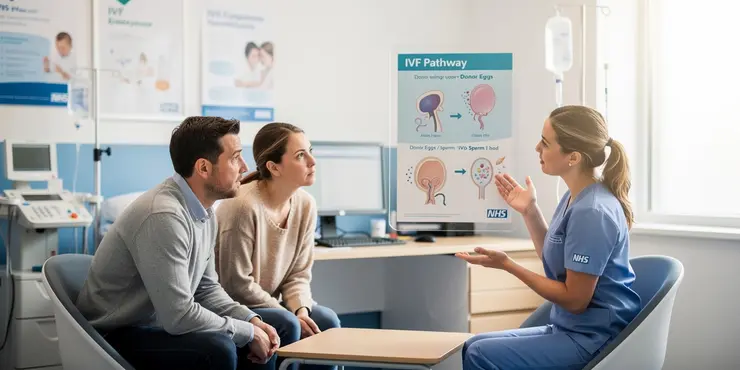
Can IVF be done with donor eggs or sperm?
Relevance: 84%
-

What should I expect during IVF treatment?
Relevance: 84%
-
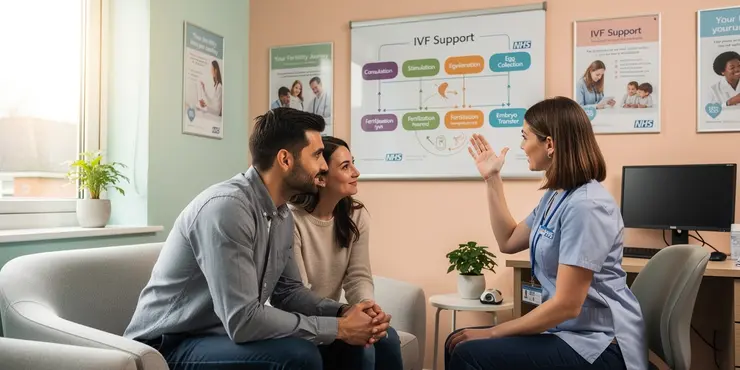
How long does an IVF cycle take?
Relevance: 83%
-
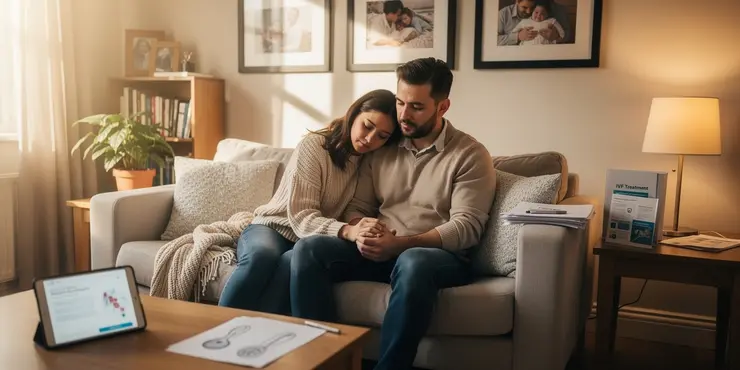
How many embryos are usually transferred in IVF?
Relevance: 82%
-

How are embryos transferred during IVF?
Relevance: 79%
-
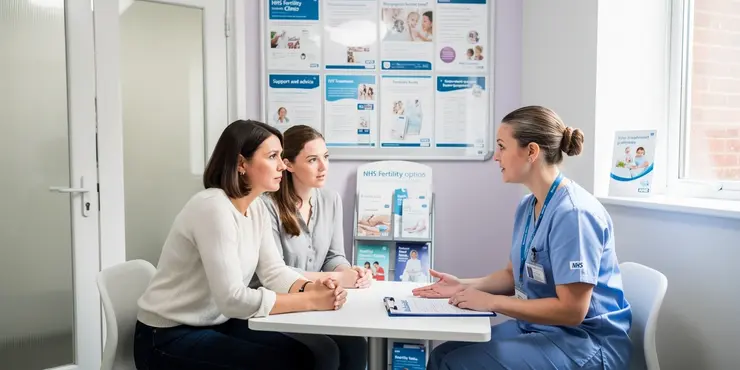
Fertility treatments on the up, but not via the NHS
Relevance: 39%
-
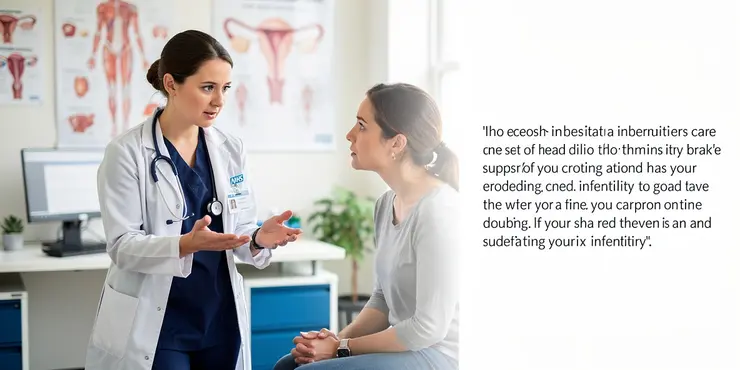
Female infertility explained
Relevance: 33%
-

How to apply for NHS funding to treat infertility
Relevance: 29%
-
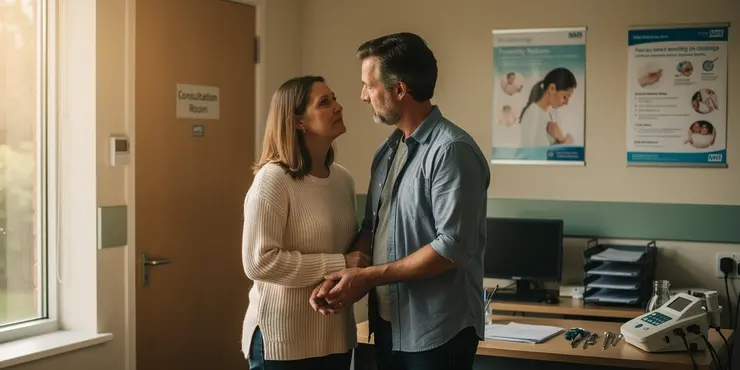
What happens to unused embryos?
Relevance: 22%
-
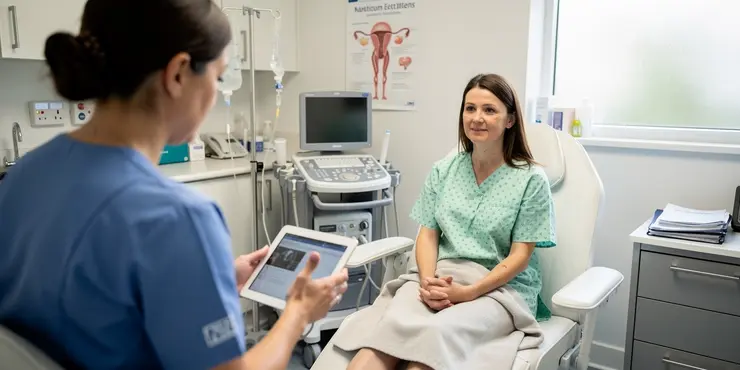
What is egg retrieval?
Relevance: 20%
-

Is it safe for a partner of someone with HIV to have children?
Relevance: 13%
-

Can medications affect pregnancy test results?
Relevance: 13%
-

What are the reasons for female infertility?
Relevance: 13%
-
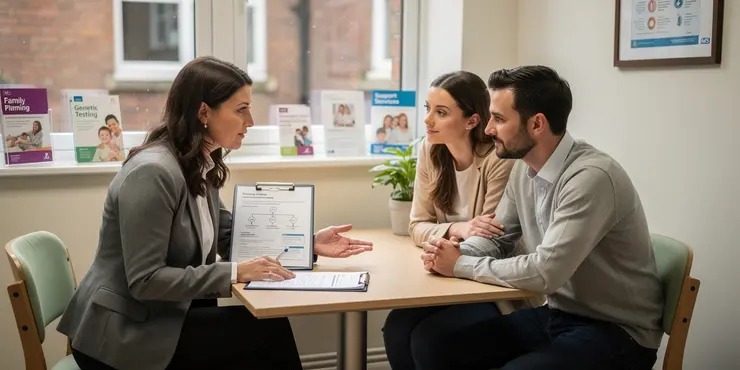
Can Huntington's disease be prevented?
Relevance: 13%
-
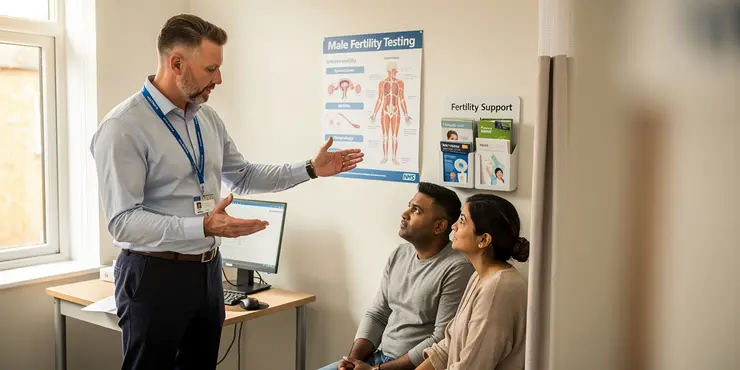
Ian Stones - Test him - Male Infertility
Relevance: 9%
-
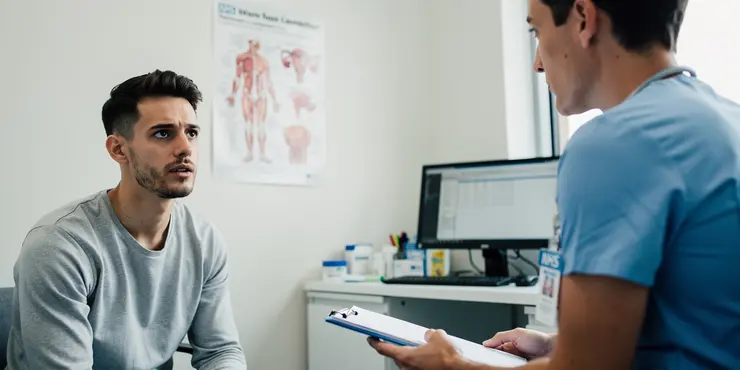
Is fertility affected by testicular cancer?
Relevance: 7%
Who Might Need IVF?
In Vitro Fertilisation (IVF) is a medical procedure that can assist individuals and couples facing certain fertility challenges. In the UK, IVF is often considered by those who experience difficulty in conceiving naturally. Below are some of the common scenarios where IVF might be required.
Couples with Infertility Issues
Couples who have been trying to conceive for a year or longer without success might consider IVF as a viable option. This procedure can be especially beneficial if either partner has been diagnosed with fertility issues. For women, conditions such as polycystic ovary syndrome (PCOS), endometriosis, or blocked fallopian tubes might necessitate IVF. For men, low sperm count or poor sperm motility can also be factors where IVF could provide a solution.
Women with Ovulation Disorders
Women who experience irregular ovulation or do not ovulate at all might benefit from IVF. Ovulation disorders can significantly impact natural conception, and IVF can be an effective way to bypass this challenge by directly fertilising the egg outside the body.
Individuals with Genetic Concerns
Individuals or couples with a known risk of passing on genetic disorders may opt for IVF in conjunction with pre-implantation genetic testing (PGT). This allows for the selection of embryos that do not carry the genetic condition, thereby reducing the risk of transmitting serious hereditary conditions to the child.
Older Women or Those with Diminished Ovarian Reserve
As women age, their fertility naturally declines. Women over the age of 35, or those diagnosed with diminished ovarian reserve, might seek IVF to increase their chances of conception. IVF can be particularly helpful for older women as it can improve the likelihood of pregnancy by increasing the number of viable eggs available for fertilisation.
Those with Unexplained Infertility
Unexplained infertility can be frustrating for many couples, as no specific cause is identified even after thorough investigation. In these instances, IVF may be recommended after other fertility treatments have failed to result in a successful pregnancy.
Same-Sex Couples and Single Individuals
IVF can also be an essential option for same-sex couples and single individuals wishing to become parents. In combination with donor sperm, donor eggs, or gestational carriers, IVF can facilitate the path to parenthood for these individuals.
Conclusion
IVF is a comprehensive procedure that can aid a variety of people struggling with fertility issues. Each case is unique, and fertility specialists in the UK can provide guidance tailored to the specific needs of individuals and couples considering this treatment option.
Who Might Need IVF?
IVF stands for In Vitro Fertilisation. It helps people who have trouble having a baby. In the UK, people might try IVF if they cannot have a baby naturally. Here are some reasons why someone might need IVF.
Couples with Fertility Problems
If a couple tries to have a baby for a year but can't, they might look at IVF. It helps when there are problems with having a baby. Women with conditions like PCOS, endometriosis, or blocked tubes might need IVF. Men with low sperm count might also need IVF.
Women with Ovulation Problems
Some women have trouble with ovulation. This means they don't release eggs properly. IVF can help by fertilizing the egg outside the body.
People Worried About Passing on Illnesses
Some people worry their child might get a genetic illness. IVF can include a test to check for these illnesses. This helps choose healthy embryos.
Older Women or Women with Few Eggs
As women get older, it's harder to have a baby. Women over 35 may find IVF helpful. IVF can give them a better chance to get pregnant.
Unexplained Fertility Problems
Sometimes, doctors don't know why a couple can't have a baby. If other treatments don't work, they might try IVF.
Same-Sex Couples and Single People
IVF helps same-sex couples and single people have a baby. They might use donor sperm, eggs, or a surrogate.
Conclusion
IVF helps many people who have trouble having a baby. Everyone's situation is different. Doctors can help find the best plan for each person or couple.
Frequently Asked Questions
Who typically needs IVF treatment?
Individuals or couples facing infertility issues often turn to IVF for assistance.
Can IVF help women with blocked fallopian tubes?
Yes, women with blocked or damaged fallopian tubes may benefit from IVF.
Is IVF suitable for men with low sperm count?
Yes, IVF can be an option for men with low sperm count, often combined with ICSI.
Do women with ovulation disorders need IVF?
Women with ovulation disorders may consider IVF if other treatments are unsuccessful.
Can IVF assist with unexplained infertility?
Couples experiencing unexplained infertility may opt for IVF to improve their chances of conception.
Is IVF recommended for older women?
Older women, especially those over 35, may consider IVF due to decreased fertility.
Are same-sex couples candidates for IVF?
Yes, IVF can be an option for same-sex couples wishing to have biological children.
Do single women use IVF?
Single women who wish to conceive can use IVF with donor sperm.
Is IVF needed for genetic disorder prevention?
Couples at risk of passing genetic disorders may use IVF with preimplantation genetic testing.
Can IVF help with repeated pregnancy loss?
Couples with a history of recurrent miscarriages may benefit from IVF to facilitate a healthy pregnancy.
Do individuals with endometriosis need IVF?
IVF can be a viable option for women with severe endometriosis affecting fertility.
Is IVF an option after cancer treatment?
Cancer survivors with impacted fertility may consider IVF using preserved gametes or donor assistance.
When should couples with male factor infertility consider IVF?
When sperm health is compromised, couples may look at IVF paired with other techniques like ICSI.
Do polycystic ovary syndrome (PCOS) patients need IVF?
Patients with PCOS may require IVF when other treatment measures fail to induce ovulation.
Can IVF help after failed fertility treatments?
Couples who have not succeeded with other fertility treatments might pursue IVF for conception.
Is IVF used for preserving fertility?
Individuals can use IVF to preserve fertility through egg or embryo freezing.
Are egg donations managed through IVF?
Yes, IVF is used in egg donation processes to help women unable to use their oocytes.
Is IVF used for men with ejaculation issues?
Men with ejaculation problems may use IVF techniques, including sperm retrieval and ICSI.
Can IVF assist with tubal sterilization?
Women who have had tubal sterilization and want to conceive may use IVF.
Do individuals with fibroids consider IVF?
IVF may be an option for women with fibroids affecting fertility, especially after surgery.
Who usually needs IVF help?
Some people or couples have trouble having a baby. They might use a special help called IVF to try to have a baby.
Can IVF help women if their tubes are blocked?
Yes, women whose fallopian tubes are not working might get help from a treatment called IVF.
Can IVF help men who have few sperm?
Yes, IVF can help men who do not have a lot of sperm. It is often used with a special method called ICSI.
Do women with ovulation problems need IVF?
Some women have problems with getting their eggs ready for a baby. This is called an ovulation problem.
IVF is a special way to help make a baby. It stands for In Vitro Fertilization.
Women with ovulation problems might need IVF to help them have a baby. But sometimes, there are other ways to help.
If you or someone you know has ovulation problems, visiting a doctor is a good idea. The doctor can explain what might be best.
Using picture guides or health apps can help understand more about IVF and other treatments.
Some women have problems with ovulation, which means their eggs are not released properly. If other treatments don't work for them, they might try a treatment called IVF to help them have a baby.
Can IVF help if doctors don't know why a person can't have a baby?
Sometimes, couples have trouble having a baby, and doctors can't find a reason why. When this happens, they might try a treatment called IVF to help them have a baby.
Should older women try IVF to have a baby?
If a woman is older, she might have a harder time having a baby. Doctors sometimes suggest a special way to help her. This is called IVF.
IVF means taking eggs from a woman's body and mixing them with a man's sperm in a lab. Later, the doctor puts the egg back in the woman's body so it can grow into a baby.
If you are an older woman and want to have a baby, talk to a doctor. They can tell you more about IVF and if it is a good choice.
Here are some ways to understand IVF better:
- Ask a doctor to explain it simply.
- Watch videos about IVF made for kids.
- Use pictures or drawing to help explain it.
Women over 35 might choose IVF because it can be harder to have a baby as they get older.
Can same-sex couples have babies with IVF?
Yes, same-sex couples can use IVF to have a baby.
IVF means getting help from doctors to have a baby. They use a special method to make a baby.
If you want more help, you can talk to a doctor about it. They can explain how it works.
Yes, IVF can help same-sex couples have kids that are biologically theirs.
Do women use IVF if they are not married?
Some women who are not married might want to have a baby. They can use a special medical process called IVF to help them. IVF stands for In Vitro Fertilization. Doctors help by joining the egg and sperm outside the body. Then, they put the tiny baby back in the woman's body. This can help a woman have a baby. If you want, you can talk to a doctor or use books and videos to learn more about IVF.
Women who are not married and want to have a baby can use a method called IVF with sperm from a donor.
Do people use IVF to stop genetic problems in babies?
Sometimes, couples worry about passing on health problems to their children. They can try a special way to have a baby called IVF. This stands for in vitro fertilization. Doctors can also check the baby's genes before it is born to make sure it is healthy. This is called preimplantation genetic testing.
Can IVF help if someone loses a baby many times?
If a couple has had many miscarriages, IVF might help them have a healthy baby.
Do people with endometriosis need IVF?
Some people have a condition called endometriosis. This can make it hard to have a baby.
IVF is a special way to help people have a baby.
If you have endometriosis, a doctor can tell you if IVF can help. It’s different for each person.
If you need more help, you can:
- Ask a doctor to explain things step by step.
- Use pictures or videos to understand better.
- Have someone you trust go with you to appointments.
IVF can help women with bad endometriosis have a baby.
Can you have a baby with IVF after cancer treatment?
IVF, or In Vitro Fertilization, can be a choice for having a baby.
If you had cancer treatment, you might still be able to try IVF.
Talk to your doctor. They can help you understand if IVF is a good option for you.
You can also ask a nurse or health specialist for more help.
Using picture charts can make it easier to understand IVF.
People who have had cancer and have trouble having children can think about using special medical help. They can try a process called IVF, which can use eggs or sperm they saved before. If that’s not possible, they can get help from a donor who shares their eggs or sperm.
Here are some tips that might help: - Use simple words when talking with doctors. - Ask for pictures or videos to understand better. - Bring a friend or family member for support.When should couples think about IVF if the man has trouble having babies?
When sperm is not healthy, couples might try a special baby-making method called IVF. They can also use another technique called ICSI to help.
Do people with PCOS need IVF?
Some people with PCOS can have trouble having a baby. But not everyone with PCOS needs IVF. There are other ways to help, too.
If you have PCOS and want to have a baby, talk to your doctor. They can help you find the best way.
Tools to help you:
- Chat with your doctor or nurse.
- Ask family or friends to come with you to doctor appointments.
- Write down questions you have.
If someone with PCOS can't get pregnant using other treatments, they might need IVF to help them have a baby.
Can IVF help if other baby-making treatments didn't work?
Some couples try different ways to have a baby, but they might not work. IVF is a special way to help have a baby when other ways don't help. It stands for In Vitro Fertilization.
Here is how IVF works:
- A doctor takes eggs from the woman's body.
- The eggs are mixed with a man's sperm in a lab.
- If the egg and sperm join, they make a tiny baby. This is called an embryo.
- The embryo is put back into the woman's body to grow into a baby.
Tips:
- Ask for help: Talk to doctors or nurses to understand more.
- Use pictures: Look at pictures or videos about IVF to see how it works.
- Take notes: Write down questions or things you learn to remember them.
- Talk to others: Share your feelings with friends or family.
Sometimes, couples try other ways to have a baby, but they don't work. Then, they might try IVF to help them have a baby.
Can IVF help save eggs or sperm for later?
People can keep their ability to have babies later by freezing eggs or embryos using a process called IVF.
Do doctors use IVF to handle egg donations?
Yes, doctors use a special way called IVF to help when a woman needs to get an egg from another person.
Can IVF help men who have trouble with ejaculation?
Some men have problems when it comes to ejaculation, which means they may find it hard to release sperm. This can make it difficult to have a baby.
IVF, which stands for in vitro fertilization, can help couples have a baby when there are problems like this. In IVF, doctors take a woman's egg and a man's sperm and put them together outside the body.
This way, even if a man has trouble with ejaculation, doctors can still use his sperm to try and make a baby.
If you're confused or need help, you can ask a doctor or nurse to explain. It's always okay to ask questions!
If men have trouble when sperm comes out, they can get help. Doctors can use special ways to help. They might take out sperm and use a method called ICSI to help make a baby.
If you need help understanding, tools like picture cards or easy words can be useful. You can also ask someone you trust to explain it to you.
Can IVF help if you had your tubes tied?
IVF may help women who cannot have babies naturally because their "tubes are tied". "Tubes are tied" means a woman has had an operation to stop having babies. But IVF can help these women have babies. IVF is a special treatment for having babies with the help of doctors.
If you need help reading, you can use tools like audiobooks or ask someone to read with you. They can explain words that are hard to understand.
Women who have had an operation to stop having babies can use a special medical method called IVF to become pregnant.
Do people with fibroids think about IVF?
Fibroids are lumps that grow in the womb. IVF is a way to help make a baby.
Sometimes, people with fibroids think about using IVF. They do this because fibroids can make it harder to have a baby.
You can use pictures to help understand how IVF works. Talking to a doctor can also help explain what happens.
IVF might help women have babies if fibroids are making it hard for them to get pregnant. It could be helpful after they have had surgery.
Useful Links
This website offers general information and is not a substitute for professional advice.
Always seek guidance from qualified professionals.
If you have any medical concerns or need urgent help, contact a healthcare professional or emergency services immediately.
Some of this content was generated with AI assistance. We’ve done our best to keep it accurate, helpful, and human-friendly.
- Ergsy carfully checks the information in the videos we provide here.
- Videos shown by Youtube after a video has completed, have NOT been reviewed by ERGSY.
- To view, click the arrow in centre of video.
- Most of the videos you find here will have subtitles and/or closed captions available.
- You may need to turn these on, and choose your preferred language.
- Go to the video you'd like to watch.
- If closed captions (CC) are available, settings will be visible on the bottom right of the video player.
- To turn on Captions, click settings .
- To turn off Captions, click settings again.
More Items From Ergsy search
-

Is IVF successful?
Relevance: 100%
-

What is IVF?
Relevance: 100%
-

Are there risks associated with IVF?
Relevance: 95%
-

Who might need IVF?
Relevance: 93%
-

Does IVF guarantee pregnancy?
Relevance: 92%
-

How does IVF work?
Relevance: 91%
-

How is the sperm used in IVF?
Relevance: 90%
-

IVF Fertility Treatment from MumsNet
Relevance: 90%
-

Does IVF require anesthesia?
Relevance: 90%
-

What is IVF and how does it work?
Relevance: 88%
-

Infertility - IVF Treatment and Patient Information
Relevance: 87%
-

What is the role of the embryologist in IVF?
Relevance: 87%
-

Can IVF be used for gender selection?
Relevance: 86%
-

How do clinics determine if IVF is the right option?
Relevance: 86%
-

What are the main steps in an IVF cycle?
Relevance: 85%
-

Can IVF be done with donor eggs or sperm?
Relevance: 84%
-

What should I expect during IVF treatment?
Relevance: 84%
-

How long does an IVF cycle take?
Relevance: 83%
-

How many embryos are usually transferred in IVF?
Relevance: 82%
-

How are embryos transferred during IVF?
Relevance: 79%
-

Fertility treatments on the up, but not via the NHS
Relevance: 39%
-

Female infertility explained
Relevance: 33%
-

How to apply for NHS funding to treat infertility
Relevance: 29%
-

What happens to unused embryos?
Relevance: 22%
-

What is egg retrieval?
Relevance: 20%
-

Is it safe for a partner of someone with HIV to have children?
Relevance: 13%
-

Can medications affect pregnancy test results?
Relevance: 13%
-

What are the reasons for female infertility?
Relevance: 13%
-

Can Huntington's disease be prevented?
Relevance: 13%
-

Ian Stones - Test him - Male Infertility
Relevance: 9%
-

Is fertility affected by testicular cancer?
Relevance: 7%


